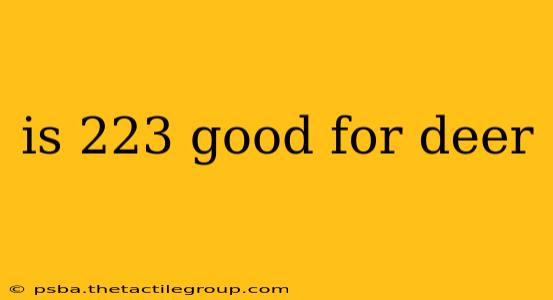Is 223 Good for Deer? A Comprehensive Look at .223 Remington for Deer Hunting
The question of whether a .223 Remington is good for deer hunting is a complex one, sparking considerable debate among hunters. The answer, simply put, is it depends. While capable of harvesting deer, its effectiveness hinges on several crucial factors, including shot placement, bullet selection, and ethical hunting practices.
Understanding the .223 Remington Cartridge
The .223 Remington, a popular cartridge known for its accuracy and relatively low recoil, is primarily designed for varmints and small game. Its smaller diameter and lighter bullets compared to cartridges traditionally used for deer hunting (like .30-06 or .308) mean that its effectiveness on deer relies heavily on precise shot placement.
Factors Affecting the Efficacy of .223 for Deer Hunting
Several factors determine whether a .223 is suitable for deer hunting in your specific situation:
1. Shot Placement: This is paramount. A poorly placed shot with any cartridge, regardless of caliber, will result in a wounded and suffering animal. With the .223, due to its lower energy transfer, precise shots targeting vital organs like the heart and lungs are absolutely crucial for a quick and humane kill. Margin for error is significantly less than with larger calibers.
2. Bullet Selection: Choosing the right ammunition is critical. Look for bullets specifically designed for deer hunting, focusing on:
- Expansion: Bullets that expand reliably upon impact, maximizing energy transfer and creating a larger wound cavity. Look for hollow point or soft point bullets designed for varmint and medium game.
- Weight: Heavier bullets (around 62-77 grains) generally offer better performance on deer than lighter ones. Heavier bullets retain more energy at longer ranges.
- Construction: A bullet's construction impacts its expansion characteristics and penetration. Choose a bullet that is designed to reliably expand without over-penetrating or fragmenting excessively.
3. Range: The effective range of the .223 on deer is significantly shorter than that of larger calibers. Beyond 200 yards, the energy and accuracy begin to drop off substantially, increasing the risk of a non-lethal or poorly placed shot. Hunting within closer ranges is strongly recommended.
4. Ethical Considerations: Ethical hunting prioritizes a clean, quick kill. Using a .223 for deer hunting requires exceptional marksmanship and awareness of its limitations. If you lack confidence in your ability to consistently make precise shots, choosing a more powerful cartridge is essential to ensure a humane harvest.
5. State Regulations: Always check your state's hunting regulations. Some states may restrict the use of certain calibers for deer hunting, including the .223.
Alternatives to .223 for Deer Hunting
Hunters who prefer a smaller caliber rifle might consider alternatives like the 6.5 Creedmoor or .270 Winchester, which offer superior performance on deer at greater ranges while still maintaining manageable recoil.
Conclusion:
The .223 Remington can be used for deer hunting, but it requires a skilled marksman who understands its limitations and prioritizes ethical hunting practices. The emphasis on precise shot placement within its effective range, along with the careful selection of appropriate ammunition, cannot be overstated. If you have any doubts about your ability to consistently make ethical shots, consider opting for a more powerful cartridge suited for deer hunting. Always prioritize a quick and humane kill.

